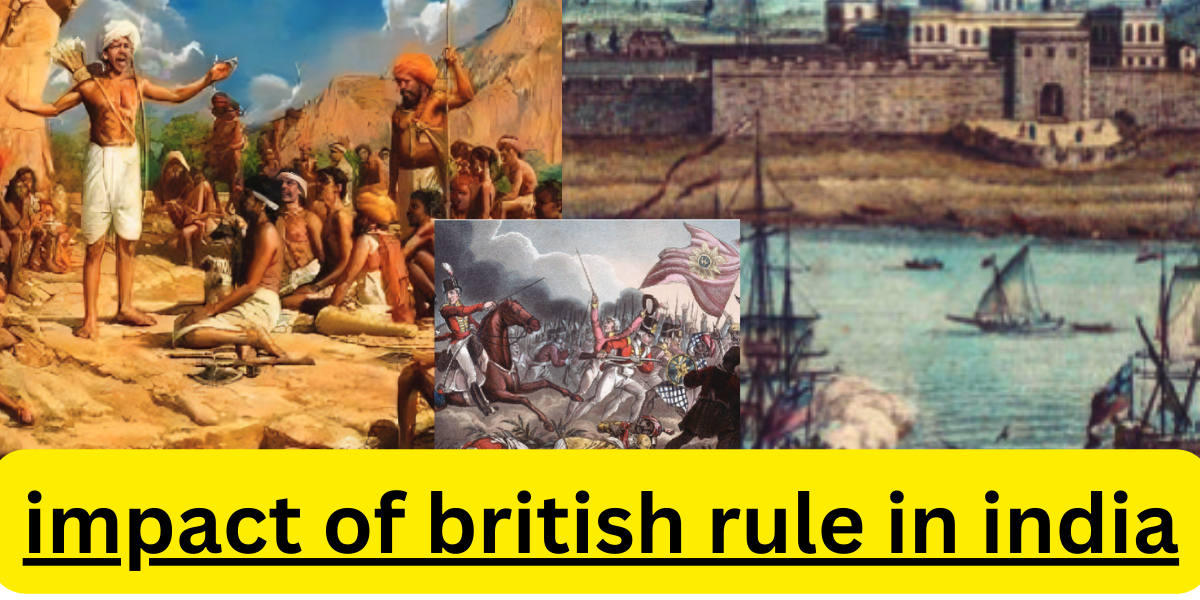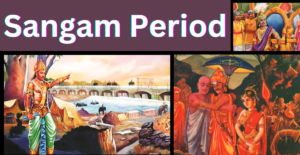Impact Of British Rule in India
Economic Impact:
Industrialization:
- The policies of the British led to the decline of Indian industry.
- Due to the high duties imposed on Indian goods, their prices were higher in European markets .
- It flooded the Indian market with low-cost British goods, causing Indian companies to fail.
Villagerization:
- The decline of industries prompted many artisans to leave their jobs and move to rural areas.
- Increased pressure on agriculture disrupts the economic balance in the villages.
Poverty among farmers:
- Britain’s land revenue practices are exploitative.
- The permanent settlement system and other schemes aimed at increasing income have caused inconvenience to farmers.
- The tenants were worried about the transfer of land and the zamindars demanded illegal charges.
Commercialization of Agriculture:
- The British introduced economic crops like coffee, indigo, cotton, jute and opium.
- The cultivation and sale of indigo was mandated by British regulations.
- These crops were sold to Britain, which helped British businesses.
The Rise of the New Money Lending Class:
- Due to excessive tax demands, farmers were forced to borrow from lenders.
- Lenders abused farmers through high interest rates and unfair practices .
- Unable to repay loans, many farmers lost their lands to creditors.
Social and Cultural Impact of British Rule in India:
- They introduced ideas such as freedom, equality, freedom and human rights.
- The English language was introduced, it became the medium of modern education and administration.
- Some social concerns such as sati, child marriage, and infanticide existed before British control, and were addressed through British intervention.
- The Charter Act of 1813 provided funds to promote Western science, reflecting a shift in the importance of education.
- Significant social reforms occurred in India, including the abolition of practices such as sati, child marriage, and slavery.
- Western ideas influenced Indian reformers such as Raja Ram Mohan Roy and Ishwar Chandra Vidyasagar, who fought for social harmony and reforms such as women’s rights and education.
Education Policy:Impact Of British Rule in India
- It aims to create a class of Indians who are loyal to the British. Hiring Indians at lower prices is expected to reduce administrative costs. As a result, education was monopolized by the wealthy and the city population.
- The Charter Act of 1813 authorized funds to promote Western science, but dissent was over winning Western ideals against traditional Indian learning.
- The British wanted to teach Western ideas exclusively in English. In 1854 Woods despatch instructed the Government of India to take responsibility for education, resulting in the establishment of academic departments and affiliated
- Some reformers, such as Raja Ram Mohan Roy, Ishwar Chandra Vidyasagar and Swami Vivekananda, incorporated Western ideas of freedom and democracy to promote social and religious practices.
- The spread of the English language and Western education facilitated the adoption of modern, , Democratic and patriotic worldview.
- Western thinkers like Max Muller and Annie Besant encouraged Sanskrit languages and literary works as ways to revitalize Indian history and culture. The press has an important role to play in fostering political awareness and communication and in increasing self-confidence and self-respect.
- Indians expressed democratic institutions and ideas of freedom, equality and self-government through their English education . Inspired by the French and American revolutions, Indians wanted similar ideals for India, resulting in a sense of nationalism. Identity.
- The early British administrators in India, known as Orientalist, celebrated India’s ancient past and founded institutions such as the Calcutta Madrasas, the Asiatic Society of Bengal, the Sanskrit College in Banaras, and the Fort William College. They study languages and literature.
Today’s Impact:Impact Of British Rule in India
- British control had a tremendous impact on every aspect of Indian life, resulting in long-term contact between two different civilizations.
- Some of the changes were purposeful, aimed at promoting British political and commercial interests, while others arose naturally as a result of cultural exchange.
- A large number of British and Europeans in India at that time also helped shape the culture.
- Current Indian life is heavily influenced by its recent history, with British control playing a significant
- Cultural and legal changes since the British period continue to have an impact on modern Indian life.
- British influence is evident in architecture such as the Rashtrapati Bhavan and Parliament, as well as in the cuisine of daily life (bread, tea, cake) and the clothes worn at that time (trousers, jackets, ties),
- The concept of Indian Civil Service originated during the British administration and the Indian military services continue to reflect European training and culture. The Supreme Court and High Courts deliver judgments in English.
Positive Impacts of British Rule in India:
- The British brought new employment opportunities, which benefited the downtrodden population and provided an opportunity for upward social mobility.
- Inter-caste marriages were legal in 1872. Slavery was abolished, and the Widow Remarriage Act of 1856 was passed with the help of Ishwar Chandra Vidyasagar.
- Governor General Lord Harding banned the barbaric practice of sacrificing children among certain tribes . The British influenced the European Renaissance and Reformation revolutions with the ideas of liberty, equality and independence.
- The British built important infrastructure such as hospitals, schools, and railways, and laid the foundation for India’s future economic prosperity.
- The British established a new law and justice system, which included the hierarchy of civil and criminal courts, which restored the sense of order and fairness of society.
- English was introduced, academic departments were created, and universities were established in major cities such as Calcutta, Madras, and Bombay in 1857. It helped spread western ideas, influencing figures like Swami Vivekananda and Ishwar Chandra Vidyasagar.
- The introduction of new technology such as steamships, telegraphs, and trains transformed India’s economic environment by improving communication and transportation.
- On December 4, 1829, the British passed the Bengal Sati Regulation Act, which ended social evils like Sati and weakened the caste system to some extent.
- The British protected countries like Persia, Afghanistan and France from external dangers by discourage them from Indian politics.However, India relied heavily on the British as a result.
- The British control resulted in the creation of an important middle class, which played an important role in the industrialization of India after independence.
Impact of British rule – Negative aspects:
- Forced imports of British goods damaged local businesses such as textiles, metallurgy and carpentry.Britain’s Indian economy was subjected to economic manipulation.
- The decline in production pushed artisans to rural areas, causing congestion and strain on the land. The advent of commercial crops caused rapid changes in land ownership, resulting in the emergence of landless
- The Charter Act of 1813 finally encouraged free trade for the British, flooding India with low-cost British goods, while heavy taxation of Indian textiles was imposed.
- The permanent solution was to try to increase the rent while creating the tenant’s concern due to the transfer of land.Railways built by the British connected the hinterland, increasing British exports and investment. The emphasis on cash crops over food crops resulted in famine and unequal food
- From 1850 to 1899, colonial poverty and shortages of food grains caused 24 famines, especially the terrible Bengal famine of 1770. England’s industrialization resulted in a reversal of the textile trade, importing machine-made garments and Indian handicrafts being affected.
- The British policy of dividing large kingdoms into smaller areas and dividing religious groups for easy control affected relations between different peoples. The East India Company’s unethical business tactics drained trillions of rupees out of India, damaged Indian businesses and sent money to London.




Pingback: Today’s Current affairs